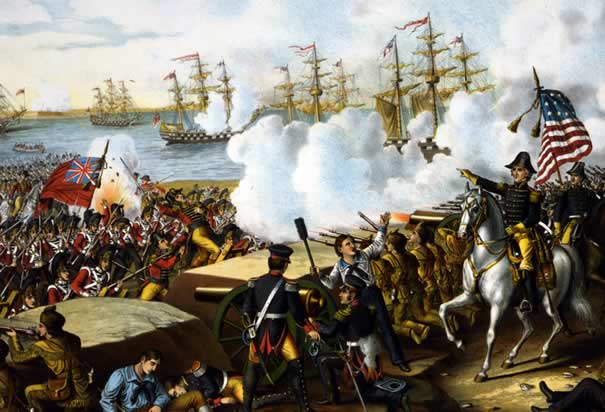Authors:
Historic Era:
Historic Theme:
Subject:
April 1956 | Volume 7, Issue 3


Authors:
Historic Era:
Historic Theme:
Subject:
April 1956 | Volume 7, Issue 3

The War of 1812 has never quite lived up to, and never quite lived down, its title of The Second War of Independence. The suspicion that it was unnecessary, the fact that it was inconclusive, the fog of disunion, apathy, and muddle that hangs about it—these provide a dismal context for its heroic episodes and figures. Even so great a reputation as that of James Madison has been somewhat stained by it.
The British Tories said at the time that the United States had stabbed Great Britain in the back by declaring war against her just when she needed all her strength for a final struggle with Napoleon. Coming from such a source, this is rather like an accusation of felony leveled by the criminal classes against the police: not necessarily untrue, but scarcely persuasive. The British felt—and their supporters in the United States agreed with them—that President Madison’s relations with Napoleon had been openly subservient; they were not sure that they had not also been collusive. They discovered a sinister coincidence in the fact that Congress declared war against Great Britain on June 18, 1812, and that Napoleon attacked Russia less than a week later.
Coincidence has little evidential value unless it is supported by the most substantial facts—in other words, unless it is shown not to be coincidence at all. As James Madison pointed out in 1827, in a letter to Henry When ton, such facts did not exist. He had not acted in concert with Napoleon. He had not guaranteed that he would consult the Emperor before making peace with the British. It was, indeed, by no means sure that he would not have to ask for a war against him , after or even during the war with Great Britain.
Madison’s predicament was that of a neutral, peaceloving statesman who was dragged most unwillingly into an avoidable war; tor Madison might, with almost equal justice, have fought the French as well as the British. The great Jeffersonian concept of the freedom of the seas was bitterly contested by the British and airily disregarded by the French; the problem was how to maintain it without going to war. The problem was not solved and never would be.
The War of 1812 was merely an episode in the Napoleonic Wars, and the Napoleonic Wars themselves were the culmination of a century-old conflict between the British and the French empires for control of the trade routes to America and India. When Napoleon advanced towards Moscow in 1812, he was advancing towards the converging point of the roads that connected the Baltic with the traffic of Asia; it was, in fact, his last and most grandiose eil’ort to find a route to India. When the Americans simultaneously invaded